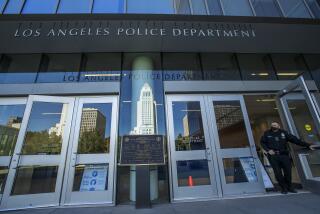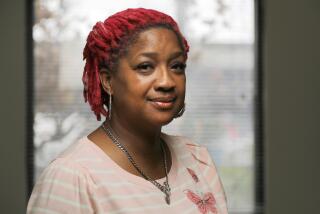Civil liberties panel is criticized at 1st hearing
- Share via
WASHINGTON — A presidential advisory commission created two years ago to monitor the effects of anti-terrorism measures on civil liberties held its first public hearing Tuesday amid criticism from advocacy groups that the panel was a paper tiger and indications that its members were wrestling with their watchdog role.
The four-member Privacy and Civil Liberties Oversight Board was urged to take a more aggressive tack in checking the power of the Bush administration in its handling of the war on terrorism. Witnesses cited concerns over such policies as the National Security Agency’s warrantless electronic surveillance program and an error-plagued terrorist watch list that has ensnared innocent citizens.
“This hearing is a welcome, but long overdue, first step in the right direction to air just some of the civil liberties transgressions of this administration over the past five years,” said Caroline Fredrickson of the American Civil Liberties Union. “Clearly, you’ve been fiddling while Rome burns.”
Created by Congress in response to a recommendation by the bipartisan Sept. 11 commission, the panel was conceived as a way to ensure the administration considers implications on privacy and civil liberties when implementing “all laws, regulations and executive branch policies.” In practice, though, its power is limited by the fact that its members are appointed by the president, whose policies they are supposed to scrutinize.
Its authority is also likely to change next month when Democrats take control of Congress. Some Democrats have proposed making the panel independent of the White House, with the power to subpoena witnesses and documents. Others have suggested that its influence could wane if Democrats take over one of the reasons for its existence -- aggressive oversight of administration policies.
But board members said at the hearing that they were taking their job seriously. They have received classified briefings on the secret surveillance program and a separate program that monitored international bank data, and were also briefed on legislation to put new limits on the surveillance program.
“This program today is an exceedingly important part of our mission to hear these points of view, and we have a great deal to learn in order to perform our statutory responsibility,” panel member Theodore B. Olson, Bush’s first solicitor general, said at the hearing. In recent months, he said, the board has met with senior officials of the Justice Department, the National Intelligence office and the National Security Agency, among others.
“We have had access to anyone that we wanted to have access to,” Olson said. “We have been able to ask any questions we wanted to, and they have been answered.”
The hearing also showed that panel members were struggling over such basic issues as whether the advice they give to the administration will ever become public.
“It is important for us to maintain the confidentiality of the recommendations that we might or might not take,” Alan Raul, a Washington lawyer and vice chairman of the panel, said in response to a question. “To share some of the private views we might have would undermine our ability to be effective as the statute contemplated.”
The panel’s lone Democrat, Lanny J. Davis, a former Clinton administration advisor, said Congress put the board in a predicament.
“We did not put ourselves in the office of the president. If Congress wanted us to be an independent agency, they would have created us as an independent agency,” he said.
*
More to Read
Sign up for Essential California
The most important California stories and recommendations in your inbox every morning.
You may occasionally receive promotional content from the Los Angeles Times.













